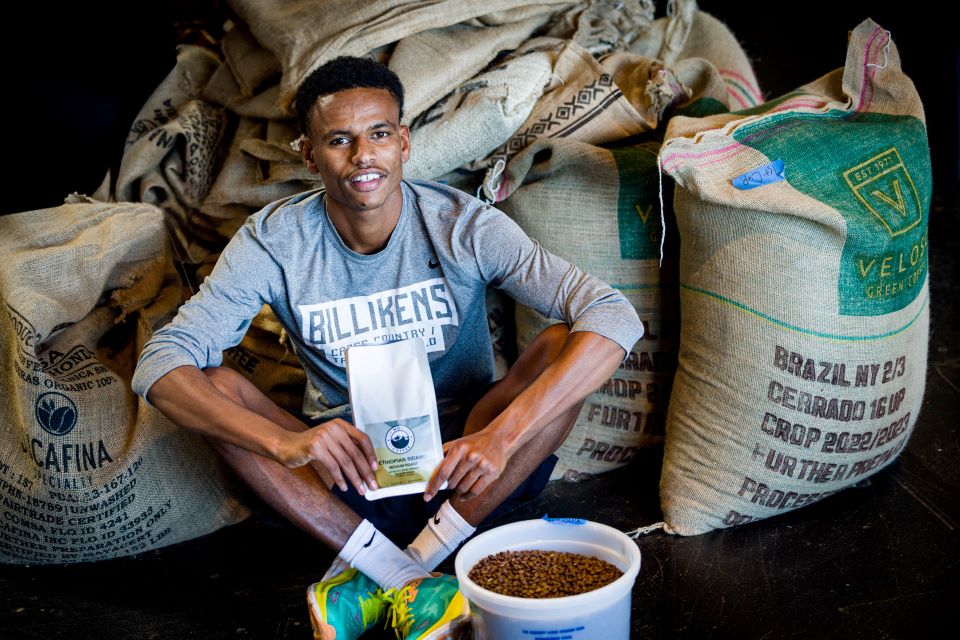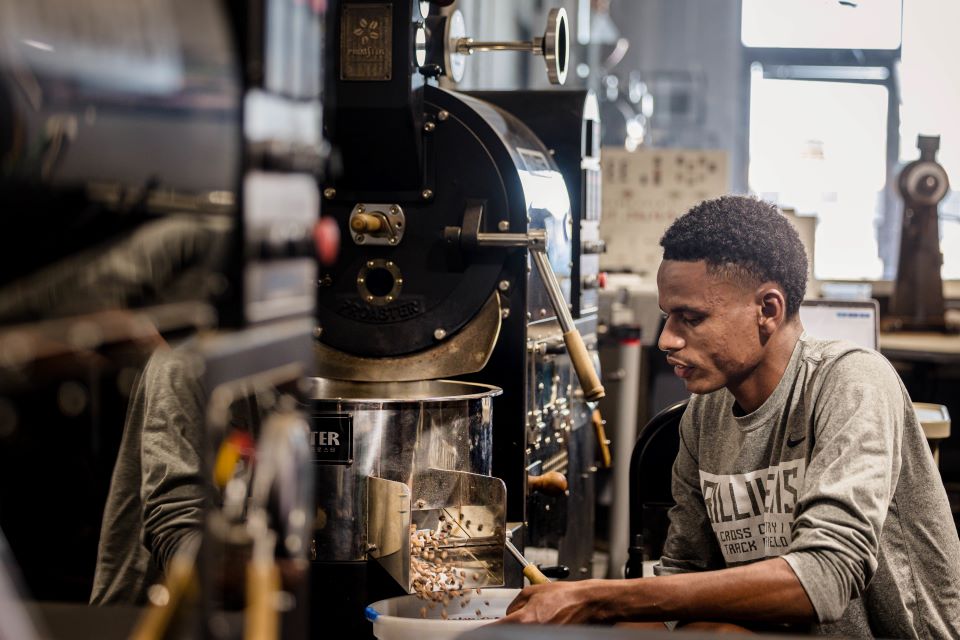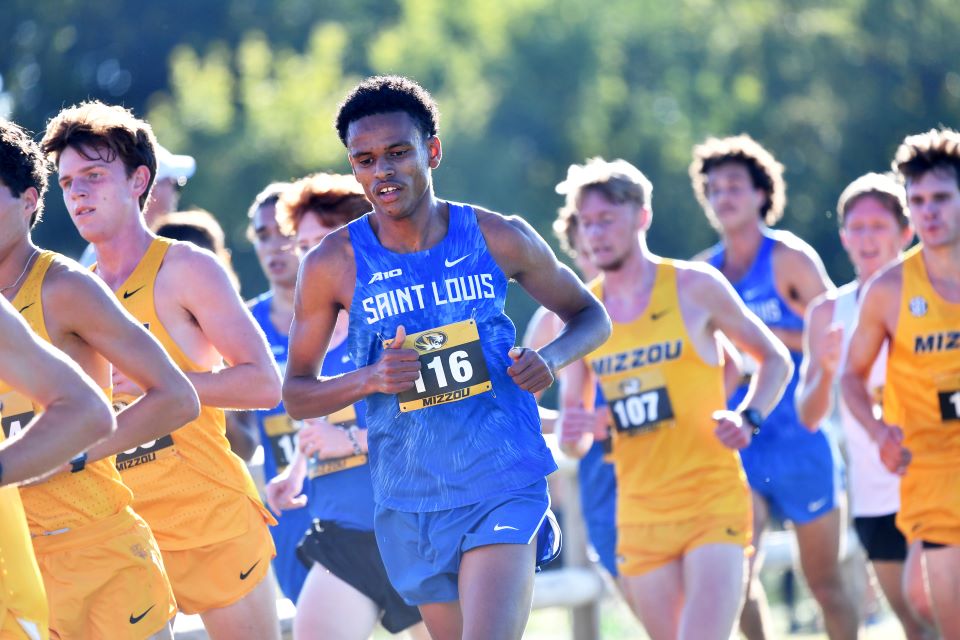SLU Student Athlete, Entrepreneur Firaol Ahmed Named a St. Louis Inno Under 25
Maggie Rotermund
Senior Media Relations Specialist
maggie.rotermund@slu.edu
314-977-8018
Reserved for members of the media.
ST. LOUIS – Firaol Ahmed, a Saint Louis University junior and a Billiken track and field athlete was named a St. Louis Inno Under 25 for 2023. Ahmed founded Moii Coffee last winter.
The St. Louis Business Journal named five Inno Under 25 honorees this year. Now in its third year, the feature seeks to spotlight some of St. Louis’ up-and-coming innovators.
The announcement described this year’s group, and particularly Ahmed, as “ambitious.” Ahmed, a finance major in the Richard A. Chaifetz School of Business, is goal-oriented. He set his sights on running, on SLU and on opening his business, and he’s accomplished all three in a matter of a few short years.
Ahmed moved to St. Louis from Ethiopia during his freshman year of high school, moving just a few minutes away from SLU’s south campus. He played soccer near campus and knew immediately that Saint Louis University was where he wanted to be.
His family chose St. Louis because Ahmed’s aunt was already in the region. After starting high school at Soldan International, his family moved to Jefferson County. As a Northwest High School senior, Ahmed began to run for the first time.
“My high school coach recommended it and said I’d be good at distance running,” he said. “I had never raced before but gave it a shot.”
It was at that first high school meet that Ahmed encountered SLU again. One of SLU’s track and field coaches was at that first meet, decked out in Billiken gear, on a recruiting trip.
“I couldn’t talk to him – I got my coach to tell him I wanted to come to SLU,” he said.
Ahmed made it to SLU, knowing he wanted to study business.
“I always knew I wanted to open a business – I’ve been entrepreneurial from a young age,” Ahmed said.
In high school he looked for opportunities around Ethiopian culture, dabbling in e-commerce around Ethiopian clothing. Once at SLU, he focused in on coffee.
“In Ethiopia, coffee is a big part of the culture,” Ahmed said.
When his mother went back to Ethiopia to visit family, she brought back Ethiopian coffee from his farming family back home. They would roast the beans at home in a pan. Ahmed shared the coffee beans with coaches and team members and their interest spurred him on.
“It was an accident really – I slowly connected the dots,” he said. “I had the farming connection and the pieces here to start doing this.”
Ahmed started with 30 pounds of green coffee beans. He built the Moii website in his dorm room and roasted the beans in small batches.
“It was trial and error, but ideas are everywhere,” he said. “I went to people who were already running businesses and asked them for help. Each time I encountered a challenge, I looked for additional mentors.”
Many of those mentors are in the Richard A. Chaifetz School of Business. Ahmed talked to faculty about marketing opportunities and how to set up a business.
“Lewis Sheats is a mentor,” he said. “Kristina Medvedeva, Rob Boyle and Jerome Katz are really, really knowledgeable and willing to help.”
After starting up, Ahmed realized he needed to improve his supply chain. Having family bring beans back when they would visit Ethiopia wasn’t sustainable. Luckily, he had another connection. His cousin owned a shop in Denver.
“It isn’t a coffee shop, but it is a place to find all sorts of things from Ethiopia,” Ahmed said. “He could add my coffee beans to his orders when he imported things for his retail business.”
The first batch of beans to land in Denver came to St. Louis via a teammate who was home for a break. He brought them back to SLU with him.
Now Ahmed orders bulk orders of green beans three times a year.
“I get a pallet from Denver every two months or so,” he said. “I keep it in my mom and dad’s garage.”
Ahmed said this routine is a major upgrade from his initial plan of shipping everything to his campus address.
“We had to use those bins they use for move-in to get it all from the mail room to my room,” he said.
He grabs what he needs each week to roast fresh each Monday at First Crack, a commercial roastery near the Missouri Botanical Garden. Ahmed ships to out-of-town buyers and hand delivers any orders within a 15-mile radius of SLU.
“I call it Moii Prime,” he says with a grin. “My local customers know that I’m faster than Amazon. I can be there within the hour.”
Since its founding in December, Moii has customers in 32 states and supplies Running Niche in Botanical Heights.
“Firaol’s work ethic is a testament to his desire to succeed in all his efforts,” Sheats said. “In the classroom and in building Moii he is curious and determined which is leading him on a pathway to success. Also, his coffee is amazing!”
Ahmed credits a loving and helpful family, support from his teammates, coaches and professors at SLU and a structured schedule with his success.
“Entrepreneurship isn’t something you completely learn in the classroom,” he said. “You have to apply what you learn in the real world. I can connect what my professors are teaching to my real-life experience.”
About the Richard A. Chaifetz School of Business
Founded in 1910, the Richard A. Chaifetz School of Business at Saint Louis University has shaped the future of industry for more than a century. As one of the oldest business schools west of the Mississippi, the Chaifetz School has built a reputation as a leader in business education committed to innovation, inclusion and impact and recognized with eight undergraduate and graduate programs nationally ranked by U.S. News & World Report.
About Saint Louis University
Founded in 1818, Saint Louis University is one of the nation’s oldest and most prestigious Catholic institutions. Rooted in Jesuit values and its pioneering history as the first university west of the Mississippi River, SLU offers more than 13,500 students a rigorous, transformative education of the whole person. At the core of the University’s diverse community of scholars is SLU’s service-focused mission, which challenges and prepares students to make the world a better, more just place.




















